第七--when-while-as-区别及练习.
when while as的区别和用法

when while as的区别和用法当谈到when,while,as时,很多人会认为它们拥有相同的意义,但实际上它们有着明显的区别。
when,while,as都可以用于表达时间上的概念,因此,其区别比较细微,正确地使用它们是掌握英语的关键。
when的用法when表示“当,在……时”,用来指时间或表达一般性的关系。
例句:I will go to school when it stops raining.当停止下雨时,我将去上学。
Don forget to call me when you arrive.你到达时,不要忘了给我打电话。
while的用法while表示“在……期间,同时,然而”,用来表示一种时间上的持续状态。
例句:I was watching TV while she was cooking.我在看电视的时候,她在做饭。
While most people enjoy the sunshine, others prefer the rain.虽然大多数人喜欢阳光,但另外一些人偏爱雨天。
as的用法as表示“正如,当……时”,用来描述正在发生的情况或行为。
例句:He arrived early, as usual.他像往常一样,很早就到了。
As I was walking home, I met an old friend.当我正在走回家的路上时,我遇见了一位老朋友。
总结从以上内容可以看出,when,while,as三者之间存在着明显的区别。
when表示“当,在……时”,用来指时间或表达一般性的关系。
while表示“在……期间,同时,然而”,用来表示一种时间上的持续状态。
as表示“正如,当……时”,用来描述正在发生的情况或行为。
这三个词不仅可以用在句子中,还可以用作连接词,来连接两个分句。
因此,正确的使用它们对于掌握。
when, while 和as 的区别及练习
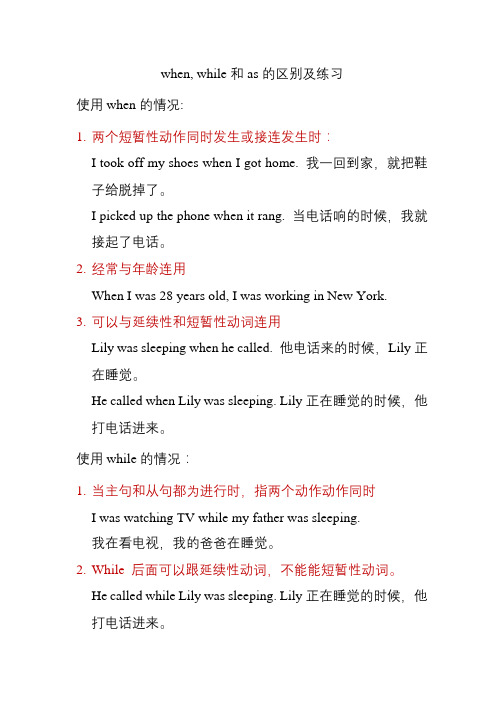
when, while和as的区别及练习使用when的情况:1.两个短暂性动作同时发生或接连发生时:I took off my shoes when I got home. 我一回到家,就把鞋子给脱掉了。
I picked up the phone when it rang. 当电话响的时候,我就接起了电话。
2.经常与年龄连用When I was 28 years old, I was working in New York.3.可以与延续性和短暂性动词连用Lily was sleeping when he called. 他电话来的时候,Lily正在睡觉。
He called when Lily was sleeping. Lily正在睡觉的时候,他打电话进来。
使用while的情况:1.当主句和从句都为进行时,指两个动作动作同时I was watching TV while my father was sleeping.我在看电视,我的爸爸在睡觉。
2.While 后面可以跟延续性动词,不能能短暂性动词。
He called while Lily was sleeping. Lily正在睡觉的时候,他打电话进来。
3.while 还可以表示然而,但是He is clever while he is very lazy. 他很聪明,但是很懒。
使用as的情况:1.As后面跟延续性动词He went back as his mother was cooking. 当他妈妈正在煮饭的时候,他回来了。
2.As 可以引导让步状语从句,但要倒装Child as he is, he is popular with a lot of people. 尽管他是小孩,但是他受很多人的欢迎与喜爱。
Try as he might, he still couldn’t make progress. 尽管他也尝试了,但是他仍然没有获得进步。
(完整版)When,while,as的区别和用法
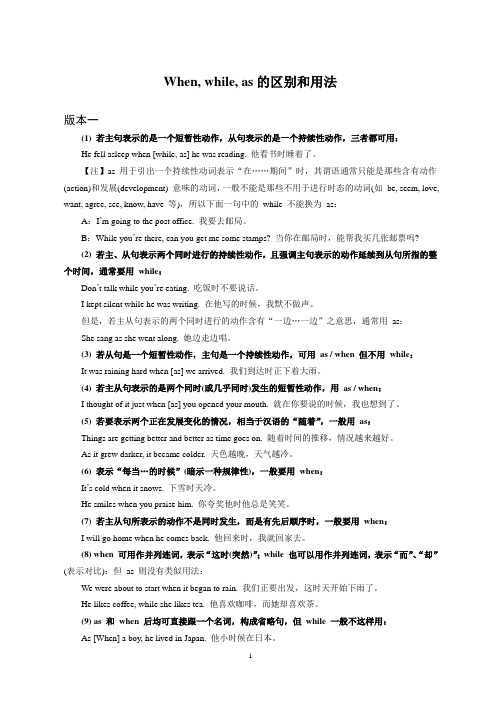
When, while, as的区别和用法版本一(1) 若主句表示的是一个短暂性动作,从句表示的是一个持续性动作,三者都可用:He fell asleep when [while, as] he was reading. 他看书时睡着了。
【注】as 用于引出一个持续性动词表示“在……期间”时,其谓语通常只能是那些含有动作(action)和发展(development) 意味的动词,一般不能是那些不用于进行时态的动词(如be, seem, love, want, agree, see, know, have 等),所以下面一句中的while 不能换为as:A:I’m going to the post office. 我要去邮局。
B:While you’re there, can you get me some stamps? 当你在邮局时,能帮我买几张邮票吗?(2) 若主、从句表示两个同时进行的持续性动作,且强调主句表示的动作延续到从句所指的整个时间,通常要用while:Don’t talk while you’re eating. 吃饭时不要说话。
I kept silent while he was writing. 在他写的时候,我默不做声。
但是,若主从句表示的两个同时进行的动作含有“一边…一边”之意思,通常用as:She sang as she went along. 她边走边唱。
(3) 若从句是一个短暂性动作,主句是一个持续性动作,可用as / when 但不用while:It was raining hard when [as] we arrived. 我们到达时正下着大雨。
(4) 若主从句表示的是两个同时(或几乎同时)发生的短暂性动作,用as / when:I thought of it just when [as] you opened your mouth. 就在你要说的时候,我也想到了。
【推荐下载】when, while, as区别详解-范文word版 (1页)
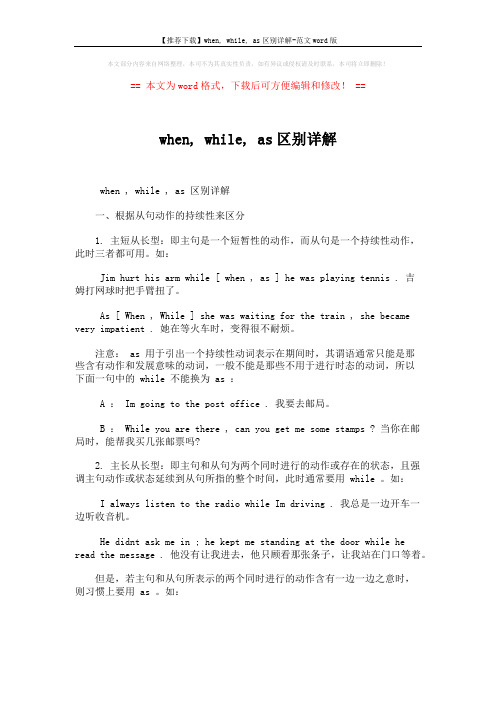
【推荐下载】when, while, as区别详解-范文word版本文部分内容来自网络整理,本司不为其真实性负责,如有异议或侵权请及时联系,本司将立即删除!== 本文为word格式,下载后可方便编辑和修改! ==when, while, as区别详解when , while , as 区别详解一、根据从句动作的持续性来区分1. 主短从长型:即主句是一个短暂性的动作,而从句是一个持续性动作,此时三者都可用。
如:Jim hurt his arm while [ when , as ] he was playing tennis . 吉姆打网球时把手臂扭了。
As [ When , While ] she was waiting for the train , she became very impatient . 她在等火车时,变得很不耐烦。
注意: as 用于引出一个持续性动词表示在期间时,其谓语通常只能是那些含有动作和发展意味的动词,一般不能是那些不用于进行时态的动词,所以下面一句中的 while 不能换为 as :A : Im going to the post office . 我要去邮局。
B : While you are there , can you get me some stamps ? 当你在邮局时,能帮我买几张邮票吗?2. 主长从长型:即主句和从句为两个同时进行的动作或存在的状态,且强调主句动作或状态延续到从句所指的整个时间,此时通常要用 while 。
如:I always listen to the radio while Im driving . 我总是一边开车一边听收音机。
He didnt ask me in ; he kept me standing at the door while he read the message . 他没有让我进去,他只顾看那张条子,让我站在门口等着。
when,while,as引导时间状语从句的区别是什么?

when,while,as引导时间状语从句的区别是什么?when和while的区别1.when是at or during the time that, 既指时间点,也可指一段时间while是during the time that,只指一段时间因此when引导的时间状语从句中的动词可以是终止性动词,也可以是延续性动词而while从句中的动词必须是延续性动词。
I was just reading a book when she came into my room.她走进我房间时,我正在看书。
You can’t do your homework while you’re watching TV.你不能一边看电视一边做家庭作业。
2.when 说明从句的动作和主句的动作可以是同时,也可以是先后发生;while 则强调主句的动作在从句动作的发生的过程中或主从句两个动作同时发生。
Were you writing when the teacher came in?老师进来的时候,你在写信吗?While Jim was mending his bike, Lin Tao came to see him.正当吉姆修自行车时,林涛来看他。
3.另外,when和while的区别还在于:while引导的时间状语从句多用进行时态,而when引导的时间状语从句多用一般时态。
While they were talking , the bell rang. 正在他们谈话的时候,上课铃响了。
I was doing my homework when my mother came back home yesterday evening.昨天晚上妈妈回家的时候,我正在做家庭作业4.when和while 还可作并列连词。
when表示“在那时”;while 表示“而,却”,表对照关系。
如:The children were running to move the bag of rice when they heard the sound of a motor bike.孩子们正要跑过去搬开那袋米,这时他们听到了摩托车的声音。
【高中英语】when, while, as区别详解(一)

【高中英语】when, while, as区别详解(一)【高中英语】when,while,as区别详解(一)高考一、根据从句动作的持续性来区分1.“主语从句从句从句从句从句从句从句从句从句从句从句从句从句从句从句从句从句从句从句从句从句从句从句从句从句从句从句从句从句从句从句从句从句从句从句从句从句。
此时,这三个都可以使用。
例如:jimhurthisarmwhile[when,as]hewasplayingtennis.吉姆打网球时把手臂扭了。
当她在等火车时,她变得非常耐心。
她在等火车时变得很不耐烦。
注意:as用于引出一个持续性动词表示“在……期间”时,其谓语通常只能是那些含有动作(action)和发展(development)意味的动词,一般不能是那些不用于进行时态的动词(如be,seem,love,want,agree,see,know,have等),所以下面一句中的while不能换为as:a:我要去办公室。
我要去邮局。
b:whileyouarethere,canyougetmesomestamps?当你在邮局时,能帮我买几张邮票吗?2.“主从式”:即主语句和从句是同时存在的两种行为或状态,强调主语句的行为或状态持续到从句所指的整个时间。
在这个时候,它通常是边走边用。
例如:ialwayslistentotheradiowhilei’mdriving.我总是一边开车一边听收音机。
然而,如果主句和从句中同时表达的两个动作包含“一边……一边”的含义,则习惯使用as。
例如:heswunghisarmsashewalked.他走路时摆动着手臂。
我可以告诉孩子们,真是太棒了。
我想不出任何故事可以告诉我的孩子们,所以我必须现在就编出来讲。
3.“主长从短”型:即主句是一个持续性动作,而从句是一个短暂性动作,此时可以用as或when,但不能用while。
如:我们开车时正在下雨。
我们到达时雨下得很大。
when[as]hecamein,iwaslisteningtotheradio.他进来时,我在听收音机。
while、when和as的用法区别
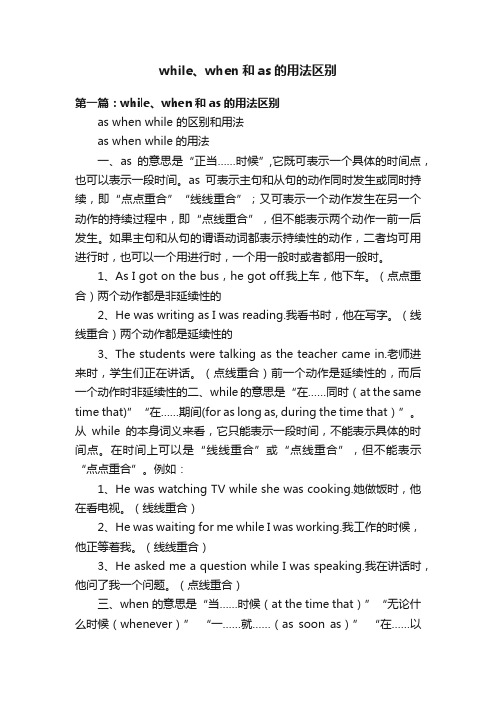
while、when和as的用法区别第一篇:while、when和as的用法区别as when while 的区别和用法as when while的用法一、as的意思是“正当……时候”,它既可表示一个具体的时间点,也可以表示一段时间。
as可表示主句和从句的动作同时发生或同时持续,即“点点重合”“线线重合”;又可表示一个动作发生在另一个动作的持续过程中,即“点线重合”,但不能表示两个动作一前一后发生。
如果主句和从句的谓语动词都表示持续性的动作,二者均可用进行时,也可以一个用进行时,一个用一般时或者都用一般时。
1、As I got on the bus,he got off.我上车,他下车。
(点点重合)两个动作都是非延续性的2、He was writing as I was reading.我看书时,他在写字。
(线线重合)两个动作都是延续性的3、The students were talking as the teacher came in.老师进来时,学生们正在讲话。
(点线重合)前一个动作是延续性的,而后一个动作时非延续性的二、while的意思是“在……同时(at the same time that)”“在……期间(for as long as, during the time that)”。
从while的本身词义来看,它只能表示一段时间,不能表示具体的时间点。
在时间上可以是“线线重合”或“点线重合”,但不能表示“点点重合”。
例如:1、He was watching TV while she was cooking.她做饭时,他在看电视。
(线线重合)2、He was waiting for me while I was working.我工作的时候,他正等着我。
(线线重合)3、He asked me a question while I was speaking.我在讲话时,他问了我一个问题。
(点线重合)三、when的意思是“当……时候(at the time that)”“无论什么时候(whenever)” “一……就……(as soon as)” “在……以后(after)”。
When while as的区别和用法
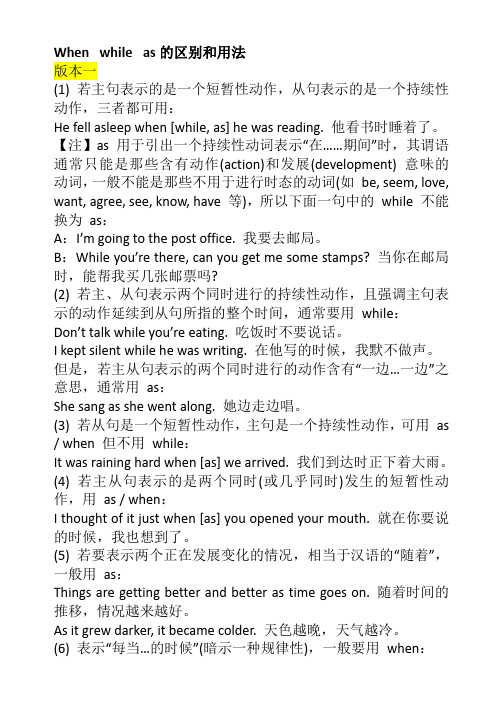
When while as的区别和用法版本一(1) 若主句表示的是一个短暂性动作,从句表示的是一个持续性动作,三者都可用:He fell asleep when [while, as] he was reading. 他看书时睡着了。
【注】as 用于引出一个持续性动词表示“在……期间”时,其谓语通常只能是那些含有动作(action)和发展(development) 意味的动词,一般不能是那些不用于进行时态的动词(如be, seem, love, want, agree, see, know, have 等),所以下面一句中的while 不能换为as:A:I’m going to the post office. 我要去邮局。
B:While you’re there, can you get me some stamps? 当你在邮局时,能帮我买几张邮票吗?(2) 若主、从句表示两个同时进行的持续性动作,且强调主句表示的动作延续到从句所指的整个时间,通常要用while:Don’t talk while you’re eating. 吃饭时不要说话。
I kept silent while he was writing. 在他写的时候,我默不做声。
但是,若主从句表示的两个同时进行的动作含有“一边…一边”之意思,通常用as:She sang as she went along. 她边走边唱。
(3) 若从句是一个短暂性动作,主句是一个持续性动作,可用as / when 但不用while:It was raining hard when [as] we arrived. 我们到达时正下着大雨。
(4) 若主从句表示的是两个同时(或几乎同时)发生的短暂性动作,用as / when:I thought of it just when [as] you opened your mouth. 就在你要说的时候,我也想到了。
- 1、下载文档前请自行甄别文档内容的完整性,平台不提供额外的编辑、内容补充、找答案等附加服务。
- 2、"仅部分预览"的文档,不可在线预览部分如存在完整性等问题,可反馈申请退款(可完整预览的文档不适用该条件!)。
- 3、如文档侵犯您的权益,请联系客服反馈,我们会尽快为您处理(人工客服工作时间:9:00-18:30)。
When while as区别一、根据从句动作的持续性来区分1、“主短从长”型:即主句是一个短暂性动作,而从句是一个持续性动作,此时三者都可用。
如:Jim hurt his arm while[when, as] he was playing tennis. 吉姆打网球时把手臂扭伤了。
2、“主长从长”型:即主句和从句为两个同时进行的动作或存在的状态,且强调主句动作或状态延续到从句所指的整个时间,此时通常要用while。
I always listen to the radio while I’m driving. 我总是一边开车一边听收音机。
He didn’t ask me in; he kept me standing at the door while he read the message. 他没有让我进去,他只顾看那张条子,让我站在门口等着。
但是,若主句和从句所表示的两个同时进行的动作含有“一边……一边”之意时,则习惯上要用as。
如:He swung his arms as he walked. 他走路时摆动着手臂。
3、“主长从短”型:即主句是一个持续性动作,而从句是一个短暂性动作,此时可以用as 或when,但不能用while。
如:It was raining hard when [as] we arrived. 我们到达时正下着大雨。
二、根据主句与从句动作是否同时发生来区分1、若主句与从句表示的是两个同时发生的短暂性动作,含有类似汉语“一……就”的意思,英语一般要用as (也可用when)。
如:The ice cracked as [when] I stepped onto it. 我一踩冰就裂了。
2、若主句与从句表示的是两个几乎同时发生的短暂性动作,含有类似汉语“刚要……就”“正要……却”的意思,英语一般要用as(也可用when),且此时通常连用副词just。
如:I caught him just when [as] he was leaving the building. 他正要离开大楼的时候,我把他截住了。
三、根据是否具有伴随变化来区分若要表示主句动作伴随从句动作同时发展变化,有类似汉语“随着”的意思,英语习惯上要用as,而不用when或while。
如:The room grew colder as the fire burnt down. 随着炉火逐渐减弱,房间越来越冷。
注:若不是引导从句,而是引出一个短语,则用with,不用as。
如:With winter coming on, it’s time to buy warm clothes. 随着冬天到来,该买暖和衣裳了。
四、根据从句动作的规律性来区分若暗示一种规律性,表示“每当……的时候”,英语一般要用when。
如: It’s cold when it snows. 下雪时天冷。
五、根据主从句动作的先后顺序来区分若主句与从句所表示的动作不是同时发生,而是有先后顺序时,一般要用when。
如: When he arrives he’ll tell us all about the match. 等他到了,他会好好给我们讲讲那场比赛的情况。
六、根据是否具有“趁机”意味来区分1、若从句所表示的“当……的时候”具有“趁机”的意味,则通常用while。
如: Strike while the iron is hot. 趁热打铁。
七、根据是否用作并列连词来区分when可用作并列连词,表示“这时(突然)”;while也可以用作并列连词,表示“而”“却”(表示对比);但as则没有类似用法。
如:I was just about to go to bed when I heard a knock on the door. 我正要睡觉,听见有人敲门。
One person may like to spend his vacation at the seashore, while another may prefer the mountain s.八、根据所引出的省略句来区分1、 as和when之后均可直接跟一个名词,构成省略句;但是while一般不这样用。
如: As [When] a boy, he lived in Japan. 他小时候在日本。
2、when和while之后可接现在分词、介词短语、形容词等构成省略句,但as一般不这样用。
如:When [While] reading, he fell asleep. 他看书时睡着了。
一.用所给动词正确行使填空1. I _____ (have) my breakfast at half past six yesterday morning.2. Mary _____ (go) over her lessons from six to seven last night. John and peter ____(do) the same thing.3. What _____ you ___ (do) at that time? We _____ (watch) TV.4. Was your father at home yesterday evening? Yes ,he was. He _____ (listen) to the radio.5. They _____(not make) a model ship when I saw him.6. _____ they ____ (have) a meeting at 4 yesterday afternoon?No, they _____. They _____ (clean) the classroom.7. ______ it ______(rain) when you left school? Yes, it ____. (No, it ____)8. What _____ your father _____ (do) when he was your age?9. One day, Edison _____ (wait) for a train to arrive, and suddenly a little boy ran to the track(轨道) to play.10. He asked me if I ______ (go) fishing that afternoon.11. The three of them were in a hurry because their plane _____ (leave) in five minutes.12. In a letter, john told us that he _____ (come) to china next month.13. When the bell rang, jenny _____ (wait) in her seat.14. She _____ (make) her dress the whole afternoon.15. While my father ____ (look) through the evening paper, he suddenly ____ a cry.16. When I ____ (come) in the room, he ____ (see) me, for he ____ (read) something17. When we _____ (arrive) at the village, it _____ (get) dark and it _____ (rain) hard.18. I _____ (know) you ____(wait) for me here.19. One day a little monkey ____ (play) in a tall tree. A mother crocodile(鳄鱼) ____ (look) for food near the bank.20. What ____ your father ____ (do) yesterday evening? He ____ (study) at the evening school.21. Later his parents found that he _____ (sit) on some eggs.22. When he knocked at the door, my aunt ____ (cook)23. The students ______ (sing) and ____ (dance) happily on the playground at that time.24. I ____ (write) a letter when the door bell rang.25. We had no classed at that time. We ____ (plant) trees.二..改错1.She is fat but I am thin.2.It was raining while we arrived.3.She sang while he walked.三.选择最佳答案:1.She thought I was praising her child,_____,in fact,I was scolding him for his bad behaviors at school.A.whatB.whileC.so thatD.therefore2.I do every single bit of housework ____ my husband Bob just does the dishes now and then.A.whileB.sinceC.whenD.as3.We were swimming in the lake ___ suddenly the storm started.A.whenB.whileC.untilD.befor四.填空:when while1.______ Margo was talking on the phone,her sister walked in.2.______ we visited the school,the children were playing games.3.______ Sarah was at the barber's,I was going to class.4.______ I saw Carlos,he was wearing a green shirt.5.______ Allen was cleaning his room,the phone rang.6.______ Rita bought her new dog,it was wearing a little coat.7.He was driving along ________ suddenly a woman appeared.8. _____ Jake was waiting at the door, an old woman called to him.9.He was reading a book ______suddenly the telephone rang.10. ______ it began to rain, they were playing chess.11. She saw a taxi coming ______ the woman was waiting under the streetlight.12. ______ the allien was in the museum,I called the police.13.The boy was walking down the street ______ a UFO landed.14. ______ the alien was visiting the museum,the boy called the TV station.15.I was cleaning my room ______ the fire broke out.。
